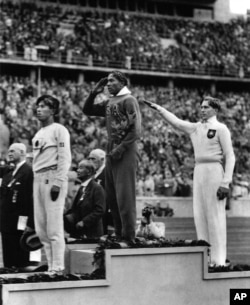When U.S. track star Jesse Owens won four gold medals at the 1936 Olympic Games in Berlin, it damaged Adolph Hitler's propaganda on Aryan supremacy. Yet, despite his triumphant wins, Owens went home to an America still deeply divided between black and white.
The film drama “Race,” by Stephen Hopkins, chronicles the Olympics, using the Great Depression as the backdrop to Owens' coming of age story as a star athlete, living with racism at home.
The youngest of 10 children, Owens realized that running fast and winning transcended race.
Leaving his family behind with a promise for a better life, he enrolled at Ohio State as a track athlete. Coach Larry Snyder recognized his potential and trained him for the 1936 Olympics in Berlin.
Decision to compete
The film follows Owens' training, as he shattered world records and as the U.S. Olympic committee wrangled over whether to participate in the Olympics under Hitler’s reign. Meanwhile, members of the African-American community urged Owens to boycott the event they considered to be a Nazi charade.
Despite the mounting pressures, Owens competed. His four Olympic gold medals deflated Hitler's Olympic ambitions and paved the way for other black athletes.
Hard journey home
However, Owens returned to a segregated America not as an Olympic hero, but as just another black man.
Stephan James, who portrays Owens in the film, said Race celebrates the athlete and what he achieved, despite the odds.
"A film like Race really shows why it doesn't matter what you look like or where you come from,” James said. “All that really matters is individual greatness."
The actor acknowledged that the U.S. has come a long way since 1936, but said there is still much more to be done.
"I think this film shows not only how far we've come since those times, but also why we can't afford to go backward,” he said. “We can't afford to take any steps backward. There are people like Jesse Owens, like a John Lewis, like a Dr. King, who have done so much so that we don't have to go through some of the same sort of things for sure."
Current controversy
Congressman John Lewis agreed.
After the Oscar nominations for acting were announced, Lewis addressed the controversy about the lack of diversity in Hollywood.
"We must continue to go forward. There may be some setbacks and some disappointments, but we must never, ever give up," he said. "We must continue to work and we will get there.
“And in the entertainment industry, we'll wake up and start including all of us. It doesn't make any difference whether we are African-American, whether we are white, Latino, Asian-American, or Native American. The industry must see us coming together as one people, one family."
As for Hollywood, it will continue this conversation on the night of the Oscars and beyond.












